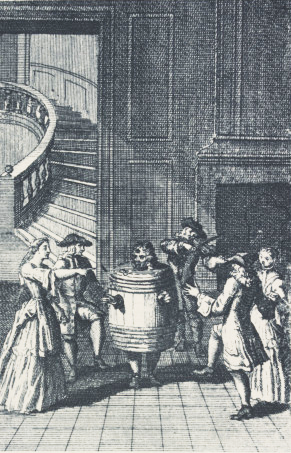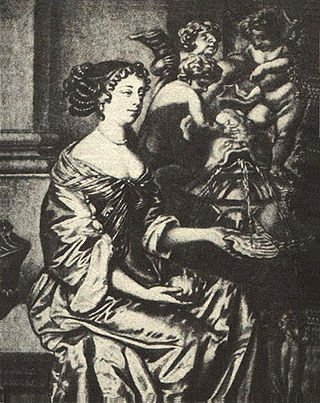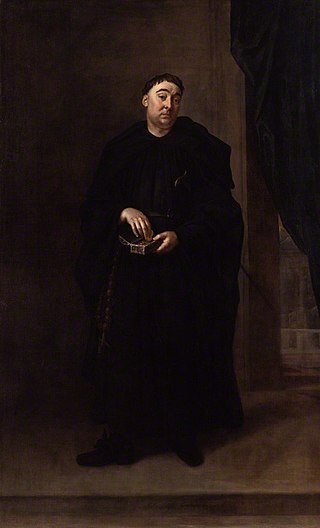Related Research Articles

Restoration comedy is English comedy written and performed in the Restoration period of 1660–1710. Comedy of manners is used as a synonym for this. After public stage performances were banned for 18 years by the Puritan regime, reopening of the theatres in 1660 marked a renaissance of English drama. Sexually explicit language was encouraged by King Charles II (1660–1685) personally and by the rakish style of his court. Historian George Norman Clark argues:
The best-known fact about the Restoration drama is that it is immoral. The dramatists did not criticize the accepted morality about gambling, drink, love, and pleasure generally, or try, like the dramatists of our own time, to work out their own view of character and conduct. What they did was, according to their respective inclinations, to mock at all restraints. Some were gross, others delicately improper.... The dramatists did not merely say anything they liked: they also intended to glory in it and to shock those who did not like it.

Mary Saunderson (1637–1712), later known as Mary Saunderson Betterton after her marriage to Thomas Betterton, was an actress and singer in England during the 1660s and 1690s. She is considered one of the first English actresses.

Cave Underhill (1634–1710?) was an English actor in comedy roles.
Anne Shadwell was an English stage actor of the seventeenth century. She was one of the first English actresses to appear on stage following the Restoration She was one of six actors recruited in 1660 by William Davenant for the new Duke's Company, acting under her maiden name Anne Gibbs. Sometime between 1663 and 1667 she married the playwright Thomas Shadwell with whom she had four children. While some sources have her acting late into the century, it may be she effectively retired with the formation of the United Company in 1682. Her appearances had decreased since 1672. Following her husband's death in 1692 she was left the bulk of his estate. She had an investment in the Drury Lane Theatre in 1709, when she joined a petition to Queen Anne by the manager Christopher Rich, but nothing is known about her after this point.
Samuel Sandford was an English character actor, known for his roles as villains.

Anthony Leigh was a celebrated English comic actor.
Mary, Lady Slingsby, born Aldridge, was an English actress. After a marriage lasting 1670 to 1680 to John Lee, an actor, during which she was on the stage as Mrs. Lee, she was widowed. She then married Sir Charles Slingsby, 2nd Baronet, a nephew of Sir Robert Slingsby, and performed as Lady Slingsby. Theatre historians have pointed out the difficulty in identifying her roles in the period when Elinor Leigh, wife of Anthony Leigh, was performing as Mrs. Leigh, because the homophones "Lee" and "Leigh" were not consistently spelled at the time.
John Bowman (1651–1739) was a British stage actor. He began his career in the Duke's Company at the Dorset Garden Theatre. In 1692, he married Elizabeth Watson, who acted under the name Elizabeth Bowman. He later switched to act at the Drury Lane Theatre. He is also referred to as John Boman.
Joseph Williams was an English stage actor of the seventeenth and early eighteenth century.
Elinor Leigh was a British stage actor of the seventeenth century.
Matthew Medbourne was an English stage actor and occasional playwright of the Restoration era. A long-standing member of the Duke's Theatre, Medbourne was a victim of the Popish Plot scare and died in Newgate Prison.
Elizabeth Currer was an Irish stage actress of the Restoration Era. She was a member of the Duke's Company during the 1670s and subsequently part of the merged United Company from 1682. Although she was likely acting in London several years earlier than this, her first known role was in The Conquest of China in 1675. Due to the irregular spelling of the time her surname is sometimes written as Carrier, Corer and Currier amongst other variants.
George Bright was an English stage actor of the seventeenth and early eighteenth century. He specialised in playing "comic dullards, fops and bouncy servants". After beginning his career in Dublin he joined the Duke's Company at the Dorset Garden Theatre in 1679 and then became part of the merged United Company in 1682.
John Richards was an English stage actor of the seventeenth century. An early member of the Duke's Company in London, he was lured away to the new Smock Alley Theatre in Dublin by John Ogilby. He was back with the Duke's at the Dorset Garden Theatre from the mid-1670s, but while in Ireland he was able to play major roles his English performances were generally supporting parts.
Thomas Percival or Percivall was an English stage actor of the seventeenth century. He was a member of the Duke's Company from 1671 to 1682 and then the merged United Company until 1686. Throughout his career he was confined to playing supporting roles, never graduating to major parts. He was the father of the actress Susanna Verbruggen. In 1693, following his retirement from the stage, he was arrested for coin clipping, a capital crime, for which he was sentenced to hang at Tyburn. The intercession of his daughter with Mary II saw his sentence commuted to transportation, but before he reached Portsmouth he died of natural causes.
Elizabeth Bowman was an English stage actress of the seventeenth and early eighteenth century. The daughter of Sir Francis Watson, 1st Baronet she was adopted by the actor manager Thomas Betterton. In 1692, she married John Bowman and began acting at Drury Lane the following year as Mrs Bowman. She was a member of the United Company until 1695 then joined Betterton's breakaway at the Lincoln's Inn Fields Theatre.

Henry Harris was an English stage actor and theatre manager. Initially a painter he was a founder member of the new Duke's Company in 1660 following the Restoration which established itself at the old Salisbury Court Theatre before moving to the new Lincoln's Inn Fields Theatre shortly afterwards. Due to his background Harris may have been a set designer and painter during his early years with the company. However, by 1661 he was acting, and his first recorded role was in William Davenant's The Siege of Rhodes that summer. He quickly established himself as the second actor in the troupe after Thomas Betterton.
John Crosby was an English stage actor of the Restoration Period. He first recorded performance is in 1662 when he appeared in Ignoramus at Whitehall Palace, likely as a child actor. It was further eight years before he was solidly established in the Duke's Company in 1670 beginning with The Forc'd Marriage by Aphra Behn. He became a regular with the company over the following decade, often playing young lover roles. He retired from the stage in 1679 and later became a justice of the peace for Middlesex. He died on 8 April 1724 and was buried in St Sepulchre.
Emily Price was an English stage actress of the seventeenth century. She was a member of the Duke's Company between 1676 and 1682, acting at the Dorset Garden Theatre in London and then joined the merged United Company. She was a friend of the playwright Aphra Behn and appeared in several of her plays. She was billed as Mrs Price.
Charlotte Butler was an English stage actress and singer of the seventeenth century. She may have joined the Duke's Company in the 1670s, but her first definite recorded performance was in Aphra Behn's The Revenge (1680) The anonymous A Satyr on The Players describes her,
References
- ↑ Lanier p.98